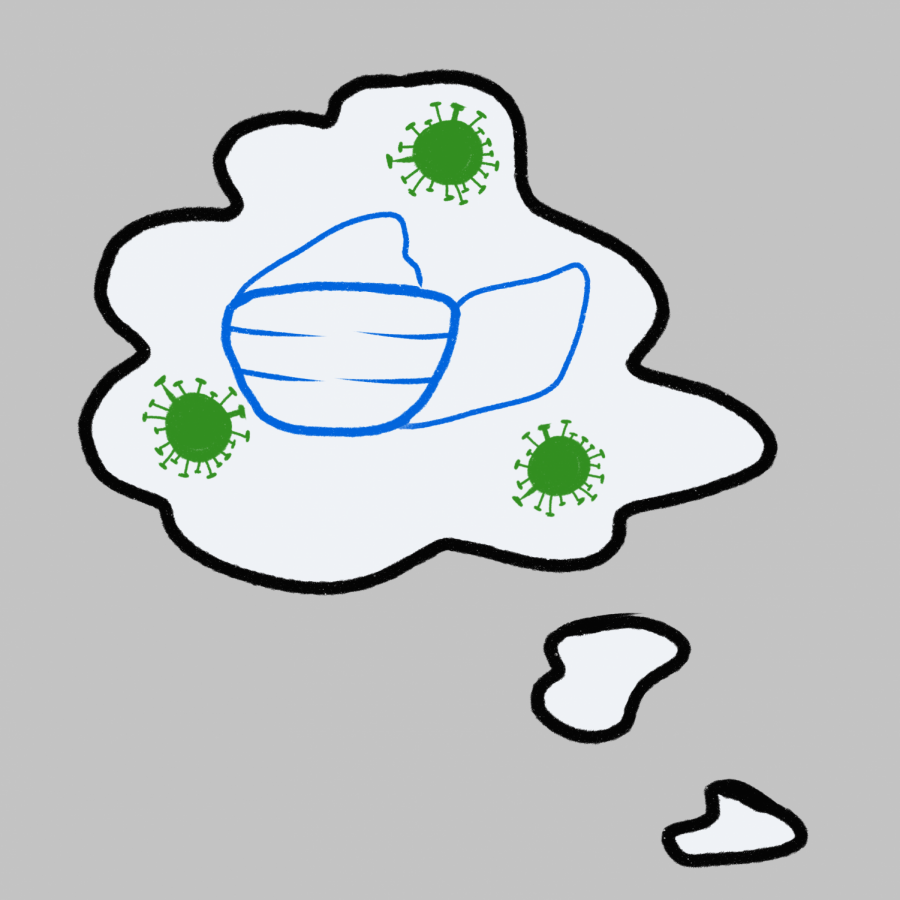Opinion | As campus life resumes, COVID-19 anxiety intensifies
August 18, 2020
The past four months have been bleak. I haven’t entered a single establishment, all of my grocery orders have been conducted via curbside pickup and my only consistent companion is Iain Stirling — the narrator of “Love Island” U.K. — because he’s the only person who can’t get voted off and break my heart.
But despite this isolation — and despite COVID-19 cases continually rising across the county — my level of concern and preparedness has not been shared by everybody. The time I’ve spent making fun of British couples from the comfort of my couch has been spent by many peers breathing heavily at crowded social gatherings and many Pitt administrators breathing heavily while pitching tents. Given this major discrepancy in attitudes toward COVID-19, I — and people like me — am left worrying that, come time to re-enter our poorly regulated campus setting, the last few months of isolation and sacrifice will have been for nothing.
These worries can be debilitating, and while I haven’t been able to control the behavior of irresponsible peers and administrators, I have figured out a few ways to curb the bouts of health-related anxiety that result from watching their recklessness. Here are a few ways that you can, too.
Put the phone down
This one’s for all the people whose browsers have recently added The New York Times’ coronavirus vaccine tracker to their list of most visited sites.
While it’s imperative to stay alert and informed about the pandemic, there’s a fine line between healthy engagement and “doomscrolling,” which leaves our minds “trapped in a vicious cycle of negativity.” Limiting phone usage can majorly mitigate this negativity, as constant screen exposure and information influx exacerbate the issue of an already racing brain, leading to sleep disruptions and worsened anxiety.
If possible, start each morning without immediately checking your phone. Just 15 screenless minutes at the top of the day allows our brains to boot up without immediate overstimulation. Not only does this leave us feeling more centered for the rest of the day, but it can promote the processing of information in a more calm and healthy manner. Similarly, stepping away from screens for an hour or two before bed can help relax the mind and minimize sleep disruptions. We’re all living the same waking nightmare, and nobody needs to be dreaming of COVID-19.
Talk to the people around you
Or, as the “Love Island” contestants would say, “have a chat.” Seriously — a great way to keep unwanted anxieties from consuming your mind is to vocalize them, so don’t hesitate to communicate with your loved ones. Speaking about your internal doom makes it feel far less chaotic and daunting than when it’s violently swirling around in the ol’ brain. Plus, according to Pepperdine University psychologist Steven Sultanoff, maintaining communicative relationships is one of the best ways to cope with stressful situations.
For those moving back to Oakland, communal living may turn into a major source of anxiety and stress. Take a bit of time to sit down with all your roommates and discuss sanitation, social distancing and any aspect of campus life that may be weighing on your mind. Although talking through the anxieties, expectations and logistics of returning to campus can’t fix the current reality, it can put everybody on the same page and make your concerns feel heard.
Email everybody
Although the logistics of fall classes remain up in the air, we still have the power of Microsoft Outlook on our side. During this period of uncertainty, reaching out to professors and advisers is a great way to communicate anxieties while better understanding how each class is set to operate. Instructors share similar concerns, and talking through a game plan may help them make sense of reality, as well.
It’s also worth noting that health-related anxiety does not exist in a vacuum — it’s directly related to and worsened by more general anxiety. Because of this, maintaining a dialogue with professors will make this new-age instruction feel more manageable than daunting.
Stay safe
Here’s the truth — many students and faculty are immunocompromised or, at least, are in frequent contact with someone who is. Due to my personal situation, this is a huge contributor to my COVID-related anxiety.
If returning to campus will severely increase the risk for you or an immunocompromised person in your life, it may be worth considering the actual feasibility of a physical return. Obviously, this isn’t always an option for those with strained home lives or financial complications. But since Pitt has provided the option to proceed with remote instruction, it may be a smart move for some students to stay home. Anxiety is a protective response, and the best way to curb it is by trusting your gut. If you or a loved one is particularly vulnerable — or if you simply feel too apprehensive to return to Oakland or in-person instruction — it may be worthwhile to ditch campus life in favor of genuine peace of mind.
Ultimately, we’re all doing our best, and health-related anxiety is a product of this moment’s uncertainty. So, regardless of what the future holds, just focus on the things you can control, like communicating, social distancing, sanitizing and wearing a mask. And please, remember to breathe. But not too heavily. And not on me.
Alison Sivitz writes about pop culture and politics. Follow her on Twitter @ali_sivi. Write to her at [email protected].








